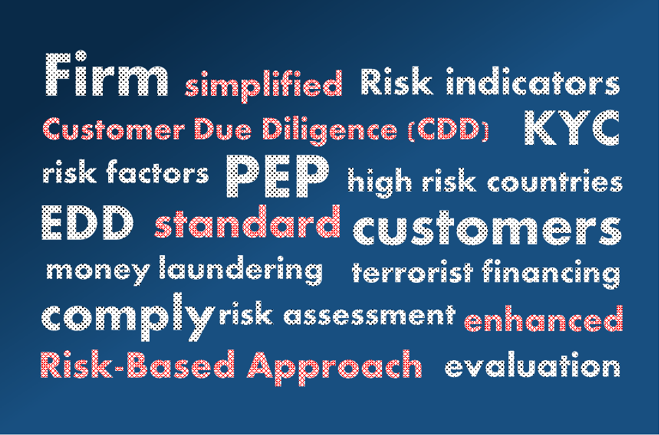10 CPD
Course Description
This course might be one of the most comprehensive courses in Risk-Based Approached (RBA) and Customer Due Diligence (CDD). It explains in detail all you need to know about RBA and Standard, Simplified and Enhanced Due Diligence. It analyses the Enhanced Due Diligence (EDD) measures to be applied in specific high-risk situations like PEPs, High risk countries and for transactions that are complex, unusually large, follow an unusual pattern, or lack apparent economic or lawful purpose. In addition, it explains the various risk factors (Client, Product/service, transaction, country, delivery channel) and describes how firms can assess and measure the level of risk based on these risk factors.
International KYC standards require obliged entities (banks, investment firms, service providers, accountants, Auditors, lawyers, etc) to take a risk-based approach to customer due diligence. This means that those customers that potentially pose a higher risk will be subject to enhanced due diligence processes. Differing levels of due diligence should be applied depending on the nature of the customer’s relationship with the obliged entity and their risk profile.
A Firm shall be, at all times, in a position to demonstrate to the regulators that the extent of measures and control procedures that applies are proportionate to the risk it faces for the use of services and products provided, for the purpose of money laundering or terrorist financing.
There is no universally agreed and accepted methodology by either governments or institutions, which prescribes the nature and extent of a risk-based approach. This course is intended to provide a suggested framework for approaching the assessment and management of potential ML/TF risks.
The risk-based approach identifies the money laundering and terrorist financing risks posed by each client and provides for a unique assessment of every client relationship, allowing firms to tailor their actions in proportion to their risk appetite. RBA allows firms to exercise reasonable business and professional judgement and scepticism with respect to clients regarding the management of potential money laundering and terrorist financing risks. For the development of a RBA, it is necessary for firms to review their internal affairs and consider what money laundering and terrorist financing risks might attach to each service type, client type etc. When performing the above mentioned exercise, the proportionality principle should be taken into account.
Firms should design a standard level of CDD for normal risk clients and a reduced or simplified CDD process for low risk clients. Enhanced due diligence should be applied to those clients that the Firm has assessed as high risk. Taking into consideration the assessed risk, the Firm shall determine the type and extent of measures it will adopt, to manage and mitigate the identified risks cost effectively.
Topics covered
The course is split into the following sections:
Section 1: Introduction to the Risk-Based Approach (RBA)
- What is the Risk-Based Approach (RBA)
- How can we define risk-based approach (RBA)
- What is the purpose of the Risk Based Approach
- Why RBA is useful for firms
- What are the main benefits of the RBA
- What are the positive characteristics of RBA
- Which steps a firm should follow in the implementation of a RBA
- What are the challenges for Firms in implementing a RBA
- Application of the Risk based approach
- Tone at the top
Section 2: Risk identification
- Identifying and Assessing risk
- How to identify risk
- Identification, recording and evaluation of risks
- Indicators to be considered for each identified risk factor
- Client Risk
- Products, Services/transactions risk
- Country/Geographical risk
- Delivery Channel Risk
Section 3: Specific High-Risk Situations
- Enhanced Due Diligence (EDD)
- Other factors to consider
- Politically Exposed Persons (PEPs)
- Clients from high-risk third countries
- Transactions that are complex, unusually large, follow an unusual pattern, or lack apparent economic or lawful purpose
- Standard/Simplified/Enhanced CDD measures
Section 4: Risk assessment
- Why conduct a risk assessment
- Variables that may impact on a RBA and risk
- What is the purpose and purpose of a risk assessment
- Assess the level of risk
- Weighting risk factors
- Risk Scoring
- Documentation of risk assessments
- Risk mitigation
- An indicative guideline for the evaluation of automated ‘off-the-shelf’ systems for the prevention of money laundering and terrorist financing
Section 5: Internal controls for an effective RBA
- Internal controls and compliance
- Internal controls and governance
- Internal mechanisms to ensure compliance
- Vetting and recruitment
- Education, training and awareness
Course Duration:
This course may take up to 10 hours to be completed. However, actual study time differs as each learner uses their own training pace.
The course is addressed to:
This course is addressed to all individuals who practice Anti-Money Laundering or interested to learn or enhance their knowledge in Money Laundering such as:
- Compliance/AML Managers and staff in Banks, Investment Firms, Investment Funds, ASPs, Trust Service Corporate Providers, Accountants, Auditors and Lawyers.
- Employees of Banks, Investment Firms, Investment Funds, ASPs, Trust Service Corporate Providers, Accountants, Auditors and Law Firms who are involved or interested to learn or enhance their knowledge in Money Laundering.
- Executive Directors, Non-executive directors, Senior Managers, Compliance Officers, Risk Managers, Product Managers, Portfolio Managers, Investment Advisors, Dealers, Marketing Managers and in general employees of investment firms, funds, ASPs. Law firms, Accountants, Auditors.
- Internal Auditors
- Consultants
- Lawyers
It is also suitable to professionals pursuing CPD in Anti-Money Laundering for the renewal of CySEC Certificate (CySEC Basic or CySEC Advance Certificate or CySEC AML Certificate) or other relevant certificates in other jurisdictions.
Training Method
The course is offered fully online using a self-paced approach. The learning units consist of power point presentations. Learners may start, stop and resume their training at any time.
At the end of the course, participants take a Quiz to complete the course and earn a Certificate of Completion once the Quiz has been passed successfully.
Accreditation and CPD Recognition
The course can be accredited by regulators and other bodies for 10 CPD Units that require CPD training in Anti-Money Laundering. The course may be also approved for up to 10 CPD Units by institutions that approve general financial and AML training, such as the CySEC, ICPAC, CBA, CISI, ICA and ACAMS.
Eligibility criteria and CPD Units are verified directly by your association or other bodies in which you hold membership.
Registration and Access
To register to this course, click on the Take this course button to pay online and receive your access instantly. If you are purchasing this course on behalf of others, please be advised that you will need to create or use their personal profile before finalizing your payment.
Access to the course is valid for 60 days.
If you wish to receive an invoice instead of paying online, please Contact us by email. Talk to us for our special Corporate Group rates.
Instructor
George Papanicolaou has more than 20-years experience in the Financial industry. He worked for several years in managerial positions as area Manager, Head of Brokerage, Compliance Officer, Anti Money Laundering Officer, General Manager and Executive Director in Cypriot Investment Firms as well as Managing Director of GP GLOBAL LTD offering consulting services and training courses to Investment Firms, focuses in Internal Audit, compliance & AML issues. He offered numerous courses/seminars both in Cyprus and abroad in Investment Firms Law as well as in Compliance & Anti Money Laundering. George Papanicolaou is also a Chairman of a Nomination Committee in a company listed in the Oslo Stock Exchange.
George Papanicolaou holds a BSc in Electronic Engineering from the University of Texas at Austin (USA), an MBA with specialization in Finance from Leicester University (UK) and a Postgraduate Certificate in the Mechanics of Risk Management from Middlesex University (UK).
He also holds an ICA International Diploma in Anti Money Laundering from the International Compliance Association and the University of Manchester, as well as an Advance and Money Laundering certificate from the Cyprus Securities and Exchange Commission for the provision of investment services/activities.
He is a Member of the AML and Compliance Committee of the Institute of Certified Public Accountants of Cyprus (ICPAC), Fellow of the International Compliance Association (FICA), Mentor of ICA new students, member of the Cyprus Institute of Internal Auditors and the first Network chair for Cyprus of the International Compliance association.
See more Courses from George Papanicolaou


